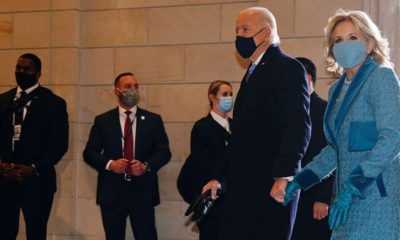Published
4 years agoon
By
CalMatters
The 2020 election was evidence of the power of Latinx voters in California. With an estimated 5.5 million Latinx votes cast during the pandemic, Latinxs were a decisive force in the outcome of the 2020 election representing 31% of the total 17.8 million votes cast in California.
As our electorate continues to grow with a Latinx voter turning 18 every 30 seconds in the U.S., Latinxs will continue to be a deciding factor in future elections.
This year, Latinxs continued to build their power and representation in California’s political system. Latinx electeds now make up a fourth of the California Assembly (20 members) and Senate (nine members), as well as four out of the eight statewide constitutional officers.
The growing voice of Latinas, in particular, was made clear by the recent selection of Eloise Reyes as the state’s first Latina Assembly majority leader. Furthermore, California’s Latinx political power is being felt nationally with the nomination of Attorney General Xavier Becerra to lead the U.S. Department of Health and Human Services at a critical moment with Latinxs bearing a disproportionate burden of the COVID-19 pandemic.
But what were the issues that motivated millions of California Latinxs to get out and vote this election cycle? According to Pew Research Center, two of the three top issues for Latinxs were health care and COVID-19. Moreover, a California poll reported that 57% of California Latinxs saw the coronavirus pandemic, followed by jobs and health care costs as the top issues. These results are not surprising.
In 2020, our community has faced the disproportionate burden of COVID-19. In California, Latinxs make up 57% of COVID-19 cases and 48% of deaths despite representing 39% of the population. From high rates of cases and death, to loss of employment, the numbers have revealed how pre-existing systemic inequities, such as a lack of access to health care and overrepresentation in low-wage jobs, accelerate morbidity and mortality for the most underserved.
California’s economic future depends on the health and well-being of Latinxs. We represent 55% of the state’s essential workers who have risked their lives to harvest and transport our food, to clean health care facilities and to keep restaurants open. It’s time for our sacrifices and contributions to be fully respected and recognized. Latinxs are essential to California and our health should be essential, too.
Now is the time to address the issues that motivated Latinxs to vote: COVID-19 and health care. As the governor and California Legislature deliberate the 2021 state budget, two immediate actions that should be prioritized are:
California can lead the way in equitable policy solutions by ensuring universal health care for all through the expansion of Medi-Cal access to all low-income seniors and working age adults. Now more than ever, it is critical to support Senate Bill 56 by Sen. Maria Elana Durazo, a Los Angeles Democrat, and Assembly Bill 4 by Assemblymember Joaquin Arambula, a Fresno Democrat.
California can be a model for the nation on how to equitably distribute the vaccine to those communities that have been the most impacted. As the state develops a COVID-19 vaccine distribution plan, essential workers – especially food and agricultural workers – should be prioritized in Phase 1B distribution. With Latinx communities reporting higher levels of distrust in the vaccine’s safety, a successful vaccination campaign must include partnerships between the state and local health departments and trusted messengers (e.g. community based organizations, community health centers and promotores/community health workers) and messages that are linguistically and culturally adapted to reach the diversity of California’s Latinx community.
Taking these steps, we will address the most urgent health needs of the Latinx community and validate the voice and vote of all Latinxs.
By Jeffrey Reynoso and Seciah Aquino, Special to CalMatters
About the Authors
Jeffrey Reynoso ([email protected]) is the executive director of the Latino Coalition for a Healthy California, [email protected]. Seciah Aquino is the deputy director of the Latino Coalition for a Healthy California. He wrote this for CalMatters, a public interest journalism venture committed to explaining how California’s Capitol works and why it matters.


California Pins Vaccine Hopes on Biden Administration


Walters: After COVID-19, Drought Threat Still Looms


Fierce California Winds Fan Fires, Topple Trees and Trucks


Monarch Butterfly Population Moves Closer to Extinction


Newsom Sets New Tone for California, White House Partnership


California Guard Pleads Guilty to Lies in Inmate’s Death




